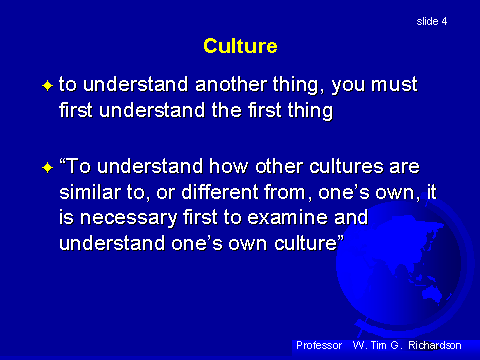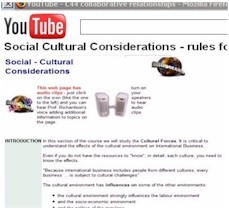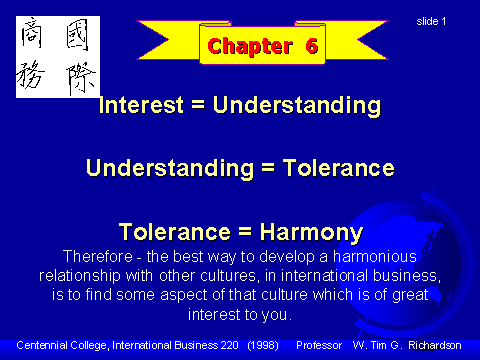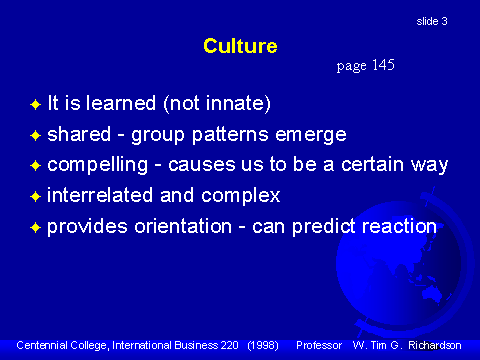Considerations

| Social
- Cultural
Considerations |
 |
 |
This web page has audio clips - just click on the icon (like the one to the left) and you can hear Prof. Richardson's voice adding additional information to topics on the page. |  |
turn on your speakers to hear audio clips |
| INTRODUCTION | In this section
of the course we will study the Cultural Forces. It is critical
to understand the effects of the cultural environment on International
Business.
Even if you do not have the resources to "know", in detail, each culture, you need to know the effects. "Because international business includes people from different cultures, every business ... is subject to cultural challenges" The cultural environment has influences on some of the other environments:
|
.
|
Cultural Awareness
Knowing about the cultural circumstances of your target country can either help you save money, or prevent making mistakes - and no consumer products company can afford to make mistakes in a intensely competitive market. The degree to which you must
be culturally aware in marketing international business products and services
depends, to some extent, on whether the product/service is a consumer product
or an industrial product.
Consumer Products,
by virtue of their marketing process
Industrial Products have less requirements, for cultural awareness, (in some instances), since the negotiation is based on a situation of which there is little debate about any required cultural adaptations. For example, the technical specifications for an industrial ceramic automotive component might be the same in New York as they are in Tokyo or Moscow. What is important, to make this sale, is the price of the component and how it fits the specifications required by the component. Other industrial products, which end up being part of a package which is evaluated by consumers, do have to incorporate Cultural Awareness, eg. components of clothing products and food products. |
| Culture
and Nation Identity
|
Some textbooks say "the
nation provides a workable definition of culture for international business
..."
In reality, there are many exceptions to this in 2015. These exceptions are the result of many political boundries breaking down as former conquered countries leave aggregated nations and identify their own independence. Examples include the break-up of Yugoslavia and the former Soviet Union, the turmoil in the Middle East between Israel and Palestine, and the recent events inside Afghanistan. It is the opinion of this world traveller that in the millenium, many nations in the world cannot be strictly defined by their political boundaries, and the political boundaries of many places are increasingly irrelevant to the mix of cultures contained by that boundary. WTGR. |
| Culture
and Nation Identity |
Cultural Imperialism
|
 |
screen shot from an old Powerpoint slide on Culture in Int'l Business |
| Culture
and Nation Identity
|
Language as a Cultural
Stabilizer
A common language can bring people together within a defined boundary
Language as one of the three
ingredients of a world power
|
| What languages are most spoken in the world? | "Including alternate (second
language) as well as primary (mother-tongue) speakers, two languages reached
approximately one billion (1,000,000,000) speakers by the end of the 20th
century. These are Putonghua or "Mandarin" Chinese, official language
of the most populous nation on earth, and English, now the most widely
used and studied language of the world. The title of "the most spoken language
on earth" presently alternates between Chinese and English within each
twenty-four hour cycle. When the sun is over the western Pacific,
the most spoken language is Chinese. When the sun is over the Atlantic
and China sleeps, the most spoken language is English."
from www.linguasphere.org/language.html |
 |
2011 4th week of January
WTGR made a video "voice
over screen capture" of the following segments discussing
|
Rules for Doing Business across Cultures
o be prepared
Don't use slang expression and metaphors when speaking English to non-English speakers - think carefully about your vocabulary and prepare simple words to explain jargon and slang that might be common in your business sector. If you say something is "a piece of cake", you might think it means easy, but a person using a foreign language-English dictionary might interpret this as meaning "a portion of a pastry". Canadians might not think we use a lot of slang, but as a result of our multi-cultural influences we do use many many slang expressions and metaphors. For example from the younger generation we have "my bad" to the older generations "beg your pardon". Also, keep in mind that we don't speak the same language across Canada, there are some regional accents that can be slightly difficult to understando slow down
click on the flagto hear an example of what I mean
So - part of being prepared is to look at the vocabulary in your marketing promotions material and think about the words in your presentations and consider substituting any phrases or terms that might be difficult for people to understand if they did not know the cultural references of some expressions.
o establish trust
In January 2012, Richardson was interviewed by The Toronto Star for a story about R.I.M.'s new graphics and imagery for marketing their new Blackberry models. Featured at http://rimblogs.files.wordpress.com/2012/01/be-bold-infographic.jpg
Richardson commented saying "this is not Obama's Blackberry"
and explained the perils of straying too far from your original "target market segment" saying you should "dance with the girl that brought you", which was misquoted as "dance with the girl that bought you" thestar.com/news/article/1123857
In retrospect this mistake of missing the "r" in "brought" probably happened because Richardson was speaking too quickly, and the listener was unfamiliar with the slag expression, which is used mostly by older people, or people that might have a rural background.
this is one of those pieces of advice that is easy to say but difficult to explain "how to do" clearlyo understand importance of language
- the personal experience of Prof. Richardson has revealed two little things that can help establish trust in the very beginning
1. be precise and accurate about directions to a meeting location - make it easy to say after "See, right where I said it was, trust me"
2. be reliable and trustworthy about time - if the meetings start at a particular time, always be early, even if the culture of the host country is casual about time
some languages are very "old" and the saying of certain words carries a meaning far beyond the dictionary meaning - depending on the contexto respect the culture
- this means do not be too eager to say words in a new language unless your translator has advised you of the proper context and accompanying body language
"De gustibus non est disputandum" - Latin: About taste there is no argument"o understand surface culture and deep culture
- don't be overly-familiar - many cultures have quite formal rules for meetings, meals and conversations
- North Americans tend to be overly eager to touch other people and to address people without using titles and rank - this is uncomfortable to some culture, particularly some cultures in Asia
"Beyonce" recently (Oct 2007) made headlines when she decided NOT to do some concerts in Malaysia in response to Malaysia's restrictions on what performers can "reveal" in their clothing on stage. CBC reported that "Malaysian authorities are warning once again that music performers should follow strict government policies if they want to stage concerts". The Ministry introduced a "compulsory dress code and other rules for performers in 2005."
Entertainment is "big business" and "international business" and is an obvious situation where clashes in the "social-cultural environment" meet with rules and regulations of the "political environment"
some subjects are taboo, unless you are from that cultureo be sensitive to different body language and different meanings of gestures
- as a non-Japanese, it would be very difficult to phrase a question about Nagasaki or Hiroshima without offending someone in Japan, so don't
o keep the appropriate physical space/distance and eye contact in conversations
In some cultures, some parts of the body might be considered offensive if you touch them, or cause them to be shown. listen to an example
o understand that within each culture there may be strong differences based on
listen to an example
This list is a combination of some existing points from Traditional IB Textbooks + some additional recommendations based on the personal international travel experience of Prof. Richardson
|
|
 |
EDC - Export Development Canada is a federal government that provides services to Canadian companies exporting. As part of its activities, it has an informative web site that provides information to assist people in export development planning |

Some companies are opting for multilingual multimedia presentations to attract international buyers. These are easy to store and transport on diskette, and can be displayed on laptops or projection screens. Also, information, data, specifications and price lists can be easily and rapidly modified or updated at little cost.
Corporate videos dubbed in
foreign languages are another handy vehicle to promote products or services.
While videos are certainly more expensive to produce than a web site, video
players are a less expensive technology for play-back and are more commonly
used overseas than computers. Also, internet access may not be available
in certain countries because of government controls or because the service
is expensive due to monopoly providers."
written by Hassan Eltaher,
president of East & West Communications, a multilingual communications
and video production company - for the EDC
.
|
|
 |
Powerpoint Presentation
on culture from
an old text -  |
 |

|
| Cultural
Forces |
.
Aesthetics - a culture's sense of beauty and good taste Attitudes and Beliefs
Education
attitudes towards respect for government and authority figures |
|
|
| Cultural
and Economics
|
.
"Economic Environment INFLUENCES Cultural Environment: This is because some see it as an economic disadvantage to maintain the Manchu language because the main language has changed to Chinese [Mandarin]. In some ways people would see learning Chinese (standard language) over learning Manchu because it provides an economic advantage since it is the main language taught in schools or done in business. Thus, this shows how the economic environment can influence people's choice of language." "Cultural
Environment INFLUENCES Economic Environment:
The original article explains
|
|
|
| Cultural conflicts | As the "Technological Environment"
through airplane travel, cell phones, the internet etc. facilitates the
interaction of an increasing number of people in the world, it is reasonable
to expect that there will be some situations of harmony, and conflict.
The following situations are based on "real life" circumstances where a Canadian company became (willingly or unwillingly) involved in some aspect of cultural conflict 1. A Canadian of Sikh background
complained to the Ontario Human Rights Commission that a Canadian airline
did not allow him to board their aircraft and that he was discriminated
against. The airline, Canada 3000, claimed that the passenger was wearing
a ceremonial dagger that was of a size that violated their safety regulations.
|
| Cultural conflicts | 2. A UTSC student comments
on how a Canadian company felt pressured in to providing facilities and
time for one particular religilous community.
Student A.K. in March 2010 emailed me to say "Hi Professor, This is just a comment in regards to what you spoke about in class on Wednesday night. You asked an interesting question about which is more important religion or school? Well what about if religion more important than your job? I work at the Loblaw head office and recently just because 50 out of 3000 people signed a petition stating they need a room for daily prayers, they got one. Now they are trying to fight to get Friday's off to go to the mosque. I realized that once you give in to one demand people will continue to push for more and more because they know a company won't want to tarnish their reputation. As a Muslim I am pleased with the changes but at the same time don't feel it is fair to the non-muslims." |
|
|
CONTACT I MAIN PAGE I NEWS GALLERY I E-BIZ SHORTCUTS I INT'L BIZ SHORTCUTS I MKTG&BUSINESS SHORTCUTS I TEACHING SCHEDULE |
| . | |
| MISTAKES ITEXTS USED I IMAGES I RANK IDISCLAIMER I STUDENT CONTRIBUTORS I FORMER STUDENTS I | |
| . |